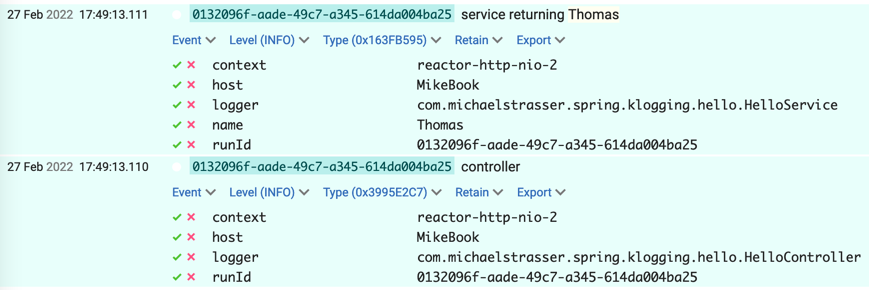Klogging with Spring Boot
Klogging works really well with Spring Boot, especially in Kotlin code.
You can set Klogging as the logging framework of a Spring Boot application. The Klogging spring boot starter makes it simple. See Gradle setup below for details.
Using Klogging in Spring Boot
Firstly, all Spring libraries log via SLF4J and log events will be processed by Klogging.
Similarly, any existing application code that uses SLF4J will also have logs processed by Klogging. You can also create structured log events with SLF4J. See Including values in messages for more information.
In Kotlin code
Spring Boot has first-class support for Kotlin, including coroutines. This means you can
use suspend functions and all of Klogging’s features for creating structured log events. A simple
example might include:
@RestController
class HelloController(
val helloService: HelloService,
) : Klogging {
@GetMapping("/hello")
suspend fun hello(): String {
return withLogContext("runId" to UUID.randomUUID()) {
logger.info("controller")
"Hello ${service.randomName()}"
}
}
}
@Component
class HelloService() : Klogging {
suspend fun randomName(): String {
return NAME_LIST.random().also {
logger.info("service returning {name}", it)
}
}
}
Klogging will produce contextual, structured logs like this:
17:49:13.110069 INFO [ reactor-http-nio-2] : .k.h.HelloController : controller : {runId=0132096f-aade-49c7-a345-614da004ba25}
17:49:13.111007 INFO [ reactor-http-nio-2] : m.s.k.h.HelloService : service returning Thomas : {runId=0132096f-aade-49c7-a345-614da004ba25, name=Thomas}
Or in Seq log aggregator:

Gradle setup
Klogging supports Spring Boot versions 3 and later.
Use a Gradle configuration like this:
configurations.all {
// Exclude any other libraries from loading Logback.
exclude("ch.qos.logback")
}
dependencies {
implementation("org.springframework.boot:spring-boot-starter-actuator")
implementation("org.springframework.boot:spring-boot-starter-webflux")
implementation("io.klogging:klogging-spring-boot-starter:0.11.7")
// Other dependencies.
}
Spring uses SLF4J for sending logs and
bundles Logback as the default provider. The exclude function shown
here is needed to exclude Logback from Spring.
Maven setup
Version 0.3.0 supports Spring Boot versions 2.x and 3.x.
Something like this:
<dependencies>
<dependency>
<groupId>org.springframework.boot</groupId>
<artifactId>spring-boot-starter-actuator</artifactId>
<exclusions>
<exclusion>
<groupId>org.springframework.boot</groupId>
<artifactId>spring-boot-starter-logging</artifactId>
</exclusion>
</exclusions>
</dependency>
<dependency>
<groupId>org.springframework.boot</groupId>
<artifactId>spring-boot-starter-webflux</artifactId>
<exclusions>
<exclusion>
<groupId>org.springframework.boot</groupId>
<artifactId>spring-boot-starter-logging</artifactId>
</exclusion>
</exclusions>
</dependency>
<!-- Other runtime dependencies -->
<dependency>
<groupId>org.springframework.boot</groupId>
<artifactId>spring-boot-starter-test</artifactId>
<!-- This exclusion may not be necessary, unlike the Gradle equivalent. -->
<exclusions>
<exclusion>
<groupId>org.springframework.boot</groupId>
<artifactId>spring-boot-starter-logging</artifactId>
</exclusion>
</exclusions>
</dependency>
<!-- Other test dependencies -->
</dependencies>
Configure Klogging
Put a klogging.json file in the src/main/resources directory of the project.
Here is a simple one for logging to the console.
{
"sinks": {
"stdout": {
"renderWith": "RENDER_ANSI",
"sendTo": "STDOUT"
}
},
"logging": [
{
"levelRanges": [
{
"fromMinLevel": "INFO",
"toSinks": [
"stdout"
]
}
]
}
]
}
